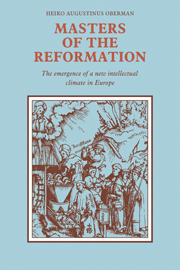Book contents
- Frontmatter
- Contents
- Preface
- Abbreviations
- Map
- PART I INTELLECTUAL RENEWAL
- PART II THE GRAPES OF WRATH
- 7 A theology of turmoil: the ferment of ideas
- 8 The ethics of capitalism: the clash of interests
- 9 The power of witchcraft: devil and devotion
- PART III NEW JERUSALEM WITHIN THE OLD WALLS
- Student population at German universities 1385–1540
- Chronological outline
- Bibliography
- Index of names and places
- Index of modern authors
- Subject index
7 - A theology of turmoil: the ferment of ideas
Published online by Cambridge University Press: 07 October 2011
- Frontmatter
- Contents
- Preface
- Abbreviations
- Map
- PART I INTELLECTUAL RENEWAL
- PART II THE GRAPES OF WRATH
- 7 A theology of turmoil: the ferment of ideas
- 8 The ethics of capitalism: the clash of interests
- 9 The power of witchcraft: devil and devotion
- PART III NEW JERUSALEM WITHIN THE OLD WALLS
- Student population at German universities 1385–1540
- Chronological outline
- Bibliography
- Index of names and places
- Index of modern authors
- Subject index
Summary
In the years following 1516 the political and social instability of its Württemberg environment began increasingly to affect the university at Tübingen. Neither the deposition of Duke Ulrich in 1519 nor the political expertise of the initial imperial vice-regent, the Netherlander Maximilian of Zevenbergen, brought the hoped-for calm. Charles V could indeed be convinced to ratify the Tübingen Treaty (1520), due partially to the persuasion of Gregory Lamparter, formerly Ulrich's chancellor and now an imperial commissioner doubling as an unofficial lobbyist for the interests of an occupied and debt-ridden Württemberg. But in view of many domestic and foreign policy difficulties, any such attempted annexation by Austria promised little in the way of lasting solutions. Anschluss at Habsburg hands was an intolerable threat to France and the Swiss Confederation and before long aroused anxiety in free cities such as Constance and Strassburg. Above all, the prospect threatened Bavaria. In Württemberg itself, Count Eberhard's policy of reunion had taken root too firmly to allow Swabian self-confidence to be shunted lightly aside. Social and religious ferment stirred up by opposition to foreign domination could only be expected to swell the ranks of the supporters of the deposed duke.
Only after Duke Ulrich's return in 1534 was the split of the university into ducal and imperial factions healed. As an eyewitness reported to Ambrosius Blarer, those elements of the population not represented in the territorial diet greeted the change of regime with applause.
- Type
- Chapter
- Information
- Masters of the ReformationThe Emergence of a New Intellectual Climate in Europe, pp. 113 - 127Publisher: Cambridge University PressPrint publication year: 1981

